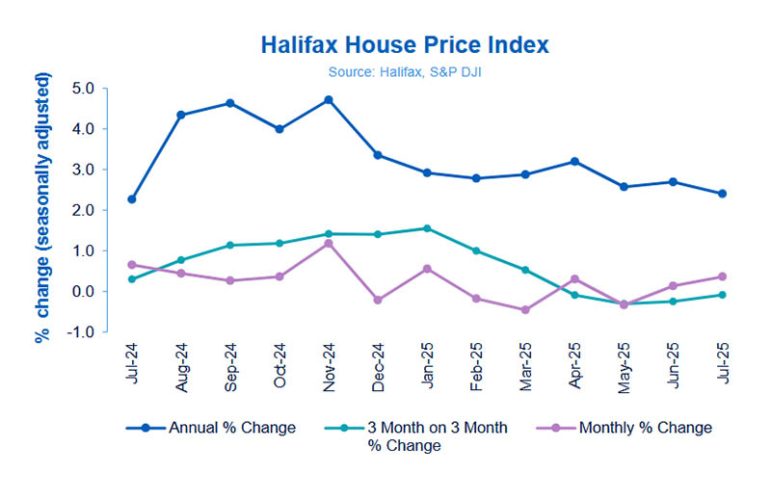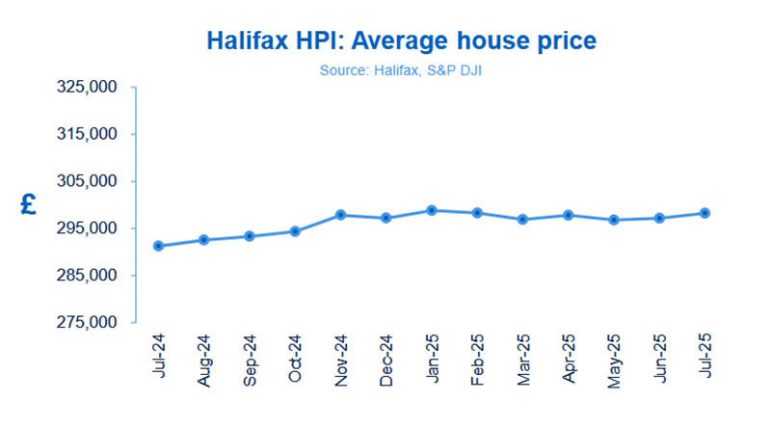 Halifax has published its House Price Index (HPI) for July 2025, reporting a 0.4% monthly increase in average property prices, the biggest monthly increase since January.
Halifax has published its House Price Index (HPI) for July 2025, reporting a 0.4% monthly increase in average property prices, the biggest monthly increase since January.
Its figures show that nationally, the average UK house price is now £298,237, up 2.4% than 12 months ago. Some regions/nations have performed notably better than others. Northern Ireland continues to be the strongest, seeing a 9.3% uplift over the past year to an average of £214,832. This is followed by Scotland (+4.7%, with average prices now at £215,238) and Wales (+2.7% to an average of £227,928.)
In England, the North West and Yorkshire & the Humber are the two regions that have recorded the highest rate of property price inflation, both up 4.0% over the last year, rising to £242,293 and £215,532 respectively. The increases in the South West, London and the South East continue to see moderate growth, with prices rising by just +0.2% and +0.5% respectively, with the capital remaining the most expensive part of the UK with a price average of £539,914.
Amanda Bryden, head of mortgages, Halifax, said: “While the national average remains close to a record high, it’s worth remembering that prices vary widely across the country depending on a number of factors, not least location and property type.”
“Challenges remain for those looking to move up or onto the property ladder. But with mortgage rates continuing to ease and wages still rising, the picture on affordability is gradually improving.
“Combined with the more flexible affordability assessments now in place, the result is a housing market that continues to show resilience, with activity levels holding up well. We expect house prices to follow a steady path of modest gains through the rest of the year.”
Agents have analysed and reacted to these latest figures.
Tom Bill, head of UK residential research at Knight Frank: “The UK housing market is getting back on its feet following the disruption of April’s stamp duty cliff edge, but high levels of supply are keeping prices in check. We expect low single-digit annual growth by the end of the year but that depends on the content of the autumn Budget. Some parts of the economy are already adopting the brace position and buyers could begin to hesitate after the summer if speculation over tax rises persists. The conundrum for the housing market is that the government needs to increase its financial headroom to keep borrowing costs in check but without sentiment-sapping tax hikes.”
Matt Thompson, head of sales at Chestertons: “Many house hunters feel that the property market now provides a window of opportunity as more properties are up for sale. Last month, some of our branches registered an evident uplift in the number of vendors wanting to sell which has motivated more buyers to resume their search and make an offer. With the Bank of England likely to cut interest rates today, we expect more buyers to proceed with their property search over the coming weeks.”
Jonathan Handford, MD of Fine & Country: “A significant uptick in house prices is not uncommon at this time of year. Potential buyers often take time out from work to shop around for homes, and this can increase competition for desirable listings. Sellers should keep their expectations realistic, as this growth varies widely across the UK – Northern Ireland has seen growth of almost 10%, compared to parts of London where prices are barely rising at all.
“Falling interest rates could spur demand and keep house prices on course for healthy growth. However, this must be tempered by the need to keep affordability intact. Strong wage growth will support this, and we are unlikely to see annual price growth surge beyond 3% in 2025.”
Read the orginal article: https://propertyindustryeye.com/halifax-house-price-index-reports-national-uptick-in-july/




